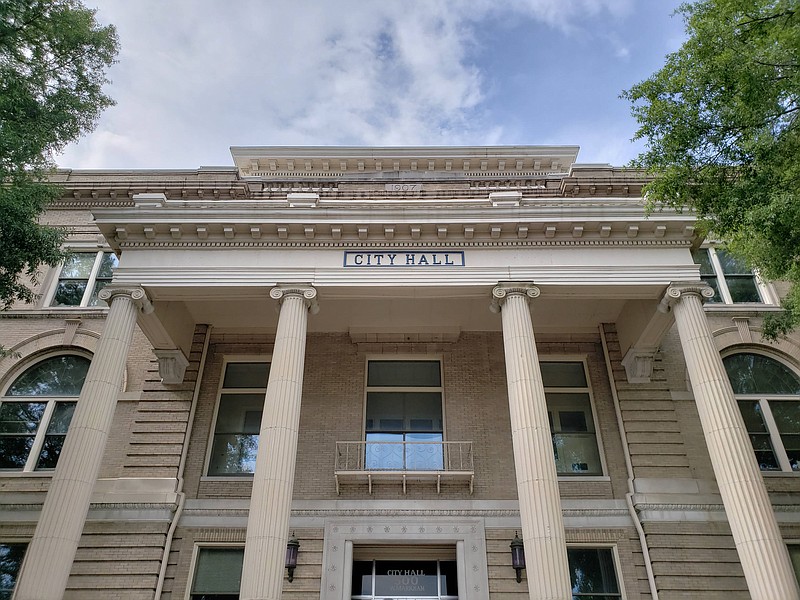An ordinance recently submitted by Little Rock City Director Doris Wright would declare youth violence to be a crisis in the city.
Members of the city Board of Directors on Tuesday discussed Wright's proposal during a review of the agenda for the April 20 meeting, when the ordinance is scheduled to be discussed and potentially adopted.
Wright, who represents Ward 6, described feeling disturbed and traumatized by recent killings within the city, especially the shooting of 10-year-old Ja'Aliyah Hughes on March 13 in Boyle Park. The city park is in Ward 6.
Wright said that she has not had a decent night's sleep since the girl died, adding that "people are living with trauma, and if we don't do something different, how are we going to face our constituents?"
Asked by Joan Adcock, city director at-large, about what good it would do to call it a crisis, Wright said the current programs aren't working. Officials need "a research-based strategy" to employ in hot-spot areas where shootings are occurring, she said.
"What we are doing, we've been doing since the '90s. This is the 21st century," Wright said, hitting a theme she brought up in the aftermath of the Boyle Park shooting. "These youth are not engaging in the program model that we have."
The ordinance would symbolically commit city directors to addressing the "youth violence crisis" by allocating $700,000 as a beginning step to fund a targeted community development initiative, which officials approved earlier this year.
Board members adopted the initiative in a symbolic resolution in January after the measure was brought forward by Wright along with Ken Richardson, Erma Hendrix and Antwan Phillips.
According to Wright's crisis-declaration ordinance, the money would come from a 1993 tax that funds the city's prevention, intervention and treatment programs.
Additional language in the ordinance would strongly encourage the mayor and city manager to have the city's Department of Community Programs establish a so-called Youth Violence Prevention Center under the rubric of its youth master plan.
The measure also refers to the work of the Derek Olivier Research Institute for the Prevention of Violence at Arkansas Baptist College, a research program named for a 19-year-old student at the college who was killed in 2012.
The current draft of the ordinance also refers to Wright's work to develop the West Central Youth Violence Prevention Center Project, a collaboration between city departments and the institute at Arkansas Baptist College. In slightly ambiguous language, the ordinance instructs city staff "to use this plan as the pilot project to be implemented by the Youth Violence Prevention Center."
Wright indicated Tuesday that her proposed violence-prevention center would be established as part of the Derek Olivier Research Institute.
During the discussion, Ward 2 representative Richardson said the people carrying out violent acts aren't young people, but a category of people who are in "transition to adulthood" in the age range of 18 to 25.
In the 1990s, he said, the violence centered on people who donned red and blue -- colors traditionally used to identify members of rival gangs.
"Today, the color's green," Richardson said, suggesting the city needs to create employment opportunities for people who were unemployed, underemployed or disconnected.
In response to some of the discussion during Tuesday's meeting, City Attorney Tom Carpenter indicated to board members that he planned to adjust elements of the ordinance's language.
The number of homicides in Little Rock during the first 2½ months of 2021 has exceeded the number during a similar period in 2020, with 11 killings compared with seven last year, the Arkansas Democrat-Gazette reported last month.
In an introductory section, Wright's ordinance cites data from the Police Department that 15 homicides have occurred in 2021, and notes that in all but one of the slayings the victims were Black.
"[T]here is no simple answer or quick fix to this complex crisis. The recognition and acknowledgement that this is indeed a crisis by City Officials is a good place to start," the ordinance states.
Mayor Frank Scott Jr. has acknowledged a recent uptick in violent crime in the city.
Scott maintained Tuesday that his proposed 1% increase in the city's sales tax "complements" Wright's vision because of the tax increase's associated projects related to quality of life, small-business development, public safety, infrastructure and early-childhood education.
Scott also called on the leaders of various city departments to step up to the podium and describe how the tax increase, which is estimated to generate approximately $53 million in new funding annually, would affect their operations.
